“During the meeting, demonstrations were taking place outside. The first thing the Speaker of Parliament asked us was how he could put an end to these. I replied that to me, that was a difficult question indeed. After all, people do have a right to freedom of speech and demonstrations.” In this CILC Story, legislative expert Jan Janus will provide insight in his activities as legal capacity building expert in the field of legislation, deriving from his varied experience as legislative expert advising members of parliament, lawyers and civil servants on different continents. He will shed his light on the importance of the way in which executive powers relate to legislation and feel subjected to the law. Janus: “This is where ‘rule of law’ starts: with decent legislation. Legislation that is generally considered just and fair.”
Interview by Marjolein C. Groot, 17 July 2015
Technical assistance to the Moldovan Parliament
“I looked at the map and asked myself: where exactly is Chișinău? That’s how it started.” Jan Janus and his colleague Karel Bongenaar arrived in the capital of the Republic of Moldova in June 1994 around 9 pm on Janus’ first CILC assignment. “A hotel had been booked for Bongenaar (who had asked me to join the mission) and me. It was still state-owned. Behind the counter a couple of burly ladies looked at us strangely. All they could serve us at that hour was a cheese sandwich.”
The next morning, Janus and Bongenaar first had a meeting with the Speaker of the Moldovan Parliament (‘Parlamentul Republicii Moldova’). Janus: “Despite the fact that by then he went under the banner of the Farmers’ Party, in Soviet times he used to be a very, very high ranking Communist leader.” During the meeting, demonstrations were taking place outside. Janus remembers quite vividly that he could clearly hear them. “The first thing the Speaker asked us was how he could put an end to these? I replied that to me, that was a difficult question. People do have a right to freedom of speech and demonstrations.”
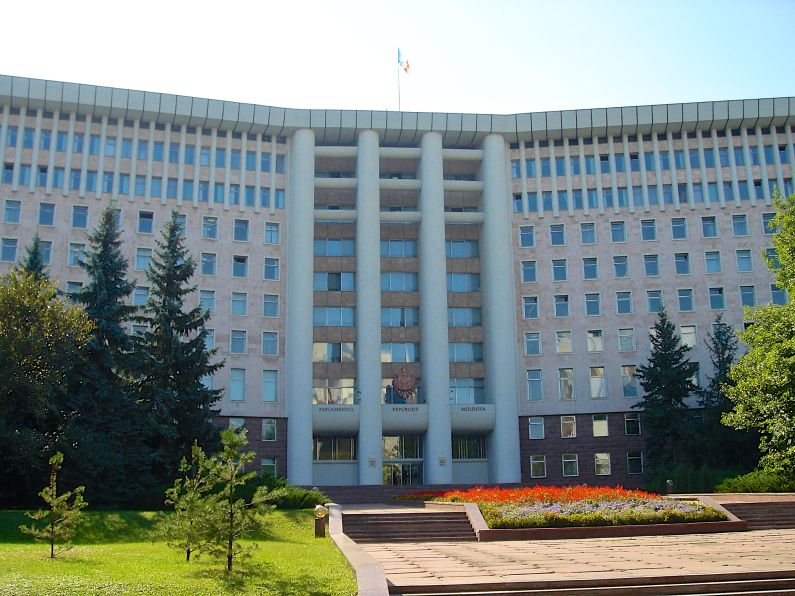
Parlament Building, Chisinau
The CILC assignment, a technical assistance project designed by the United Nations Development Programme (UNDP) and by representatives of the Moldovan Parliament, involved direct support to the Moldovan Parliament and the Moldovan Ministry of Justice (‘Ministerul Justiţiei’). Janus and Bongenaar agreed that Janus would focus on the parliament, while the latter would concentrate on the Ministry of Justice. However, on one of their first days in Chișinău, during a meeting at the Ministry of Justice with the director of Legislation, they were told: “This is not necessary at all. Besides, I am going on leave for six weeks…”. Janus: “Often, they do not think through these projects that you are assigned.”
In consultation with UNDP they decided to focus mainly on the parliament. “We would organise a seminar for the Members of Parliament (MPs) and members of the parliamentary staff. This seminar would cover subjects like how things are organised constitutionally in a Western European democracy and how this related to the Moldovan context.”
But how do you do this in practice? Janus: “There was no handbook on Moldovan constitutional law. The country had only declared its independence a few years ago in 1991. They did have an old Communist constitution. That text had been translated into English. We had obtained the Rules of Procedure of Parliament and the Law on the civil status of a deputy. Then we tried to weave a narrative out of this information. When one reads the texts, several questions arise, such as: “How does this work?” and “Why?” You try to visualise and consult your counterpart – most frequently the head of the Legal Department of the Parliament and his deputy – on a regular basis.” Janus adds: “This was often arduous, since we did not understand Moldovan or Russian. And he did not speak any other languages than those two.” The conversations always took place with the help of translators. “They were professionals, but not lawyers. And sometimes we would have those kinds of issues in which we could not transfer knowledge, because the translators did not have specialist knowledge themselves.”
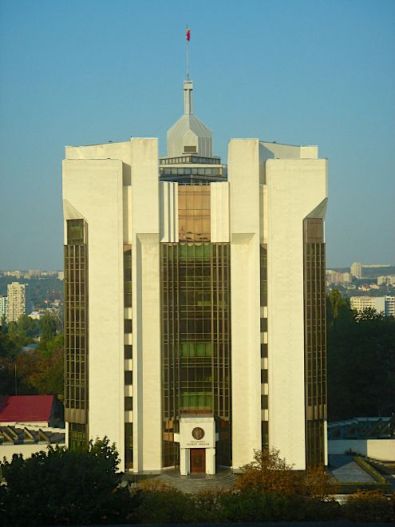
Chisinau, the office of the President
Ideally, Janus admits, for such projects it’s crucial that you and your counterpart both have command of the same language. At the very least, both should know some English. “The first time in Moldova we weren’t able to talk to anyone without a translator. To me, that’s always a problem.” However, during his next CILC project in 2006-2007, Janus could then talk to many people in English or German.
Deadly silence
About 100 MPs attended the seminar and a very vivid discussion took place. Janus: “The next day the seminar for the parliamentary staff took place. Deadly silence. Deadly silence! If I remember it correctly, only one participant, a representative from the Moldovan Ministry of Justice, posed a question. The others just watched us, very attentively. They may have thought to themselves that the seminar was ‘interesting’ but there was no discussion at all.” Janus presumed it was a remnant from the past. “If you put your head above the parapet, it might backfire.” Afterwards, a book of about 150 pages was compiled using the material distributed during the seminars, translated into Moldovan language and entitled ‘A Concise Introduction to the Constitutional Law of the Republic of Moldova.’
After one week, Janus and Bongenaar moved to a privately owned hotel around the corner from their first hotel. Janus explains: “Yes, we had to spend eight weeks in Chișinău.” It was quite large, consisting of several floors. Janus: “During the Communist era it had been truly a hotel for the high ranking party officials. Obviously, it hosted plenty of consultants. And some criminals.” Janus noticed “too many” silver Mercedes and BMWs. “That was suspicious.” Other than that, he recalled that the country was extremely poor. Janus: “To have dinner in the same hotel for eight weeks is not fun. There was an Italian restaurant in town that served caviar, but it seemed also to be involved in shady dealings. Other than this hotel and restaurant, there was hardly anything in town at the time.”
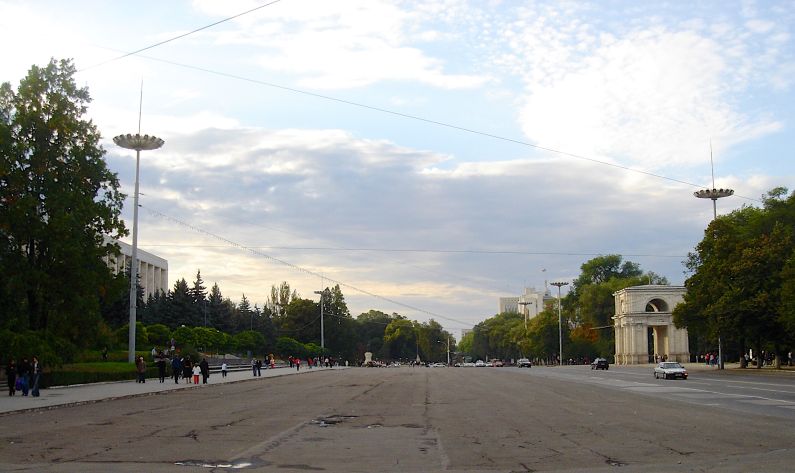
Chisinau, Stefan cel Mare Boulevard
‘Probation period’ for judges
In addition to the seminar, Janus and Bongenaar were also requested to write a commentary on several draft laws. He recalls: “It was mostly technical, and at times about quite major issues. For example, in the draft Moldovan Constitution, it said that judges are initially appointed for a period of five years. Well, you’ll understand we were not exactly happy about this article: it can quickly contradict the independence of judges, of the judiciary. This is important: you ought to be aware of what your counterpart wants and also how they want it.”
However, when discussing this issue, their counterpart told them: “Yes, you have a point about independence, but we have inherited our judges from the former regime and they were often selected on the basis of a satisfactory party membership. Therefore, we’ll have to check this article carefully. At the moment, we even have a revised draft, outlining a second ‘probation period’ of ten years for judges.” Janus: “Still no appointment for life. But as an expert, you should choose carefully how to react. Of course, you can stick with your own opinion and argue that judges should be appointed for life immediately. Our own approach in this case was to tell them we understood their rationale for the first five years, but after that they should be aware of the nature of the job of a judge. Therefore, the ten years probation period was really out of the question, because then they would really be tinkering with the division of powers and independence of the judiciary.”
This summer (2015, Ed.), Janus had another look at the Moldovan Constitution. Janus: “Indeed, the period has become five years, after which judges can continue doing their jobs until reaching pension age. So we did achieve a result, something most unlikely if we had insisted on our initial opinion.” Janus adds that by now they could delete this article, “couldn’t they”?
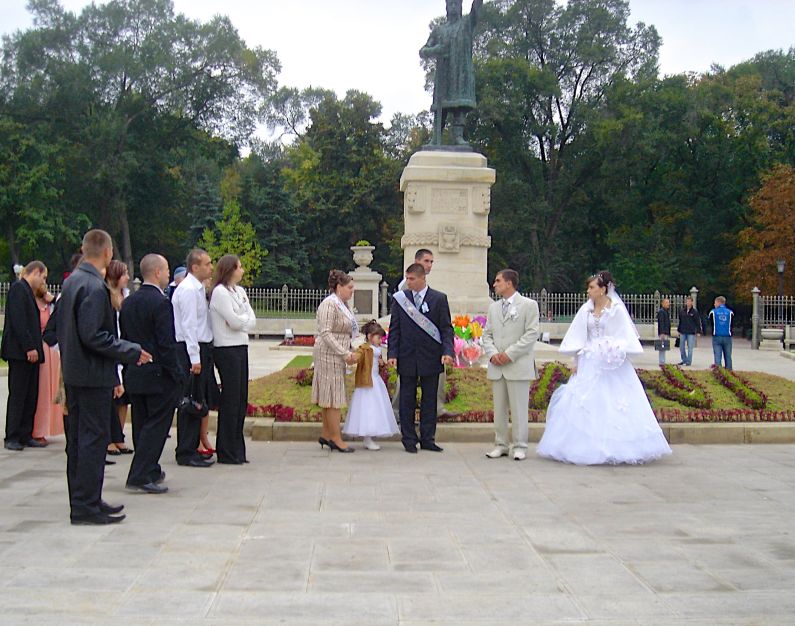
Chisinau, Statue of Stefan cel Mare – a popular spot
Prosecution as party manager
Another thing Janus and Bongenaar were very critical of in their comments was the independence of the Prosecutor-General, the prosecution service. Janus: “In Moldova, this institution had been entirely independent and was not accountable to anyone. That is by nature the wrong way of going about it. I mean, if you have power, you should be accountable to someone, shouldn’t you? Why did they have a system like this? During the Communist era, the prosecution was simply a ‘manager’ of the party. In the proposed system, the Prosecutor-General would become way too independent. In The Netherlands it’s the Minister of Security and Justice who bears the political responsibility for the Prosecution Service. And in individual cases, the prosecution is somehow accountable to the judge. Of course, you could also opt for a different system, for example one in which the Prosecutor-General is accountable to the Parliament for his prosecution policy.
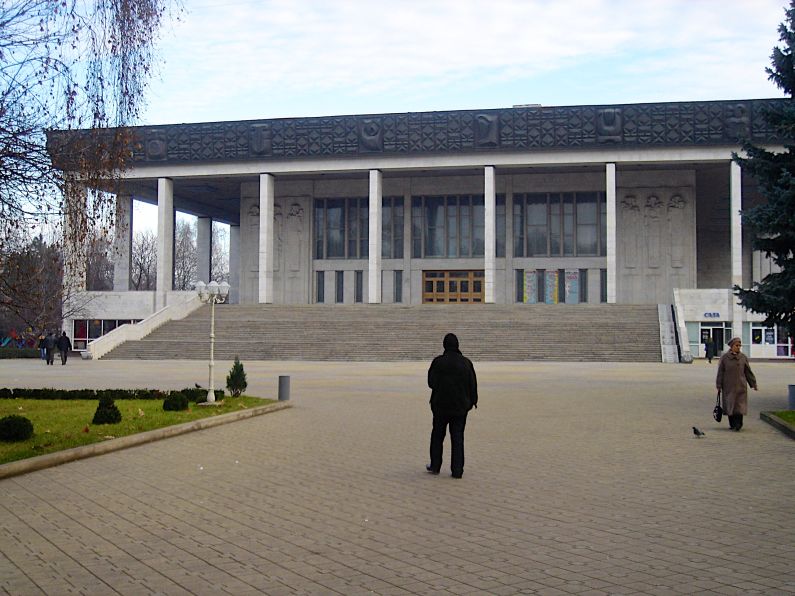
Chisinau, Opera building
Janus noticed that the Moldovans had received various other commentaries about their draft constitution. “Of course they did not mention this to us but I noticed them. Extremely clever! They ‘shop around’ and request commentaries from different parties and pick the one they like best. That’s what happens when there’s no coordination among different actors (the donors) and no-one is aware of what the other is doing.” He admits that commenting on legislation can be one of the most unnerving tasks possible. “The drafts they send you lack any explanation. You read the text and have your own thoughts about it. Why would they have written it like this? You don’t know.”
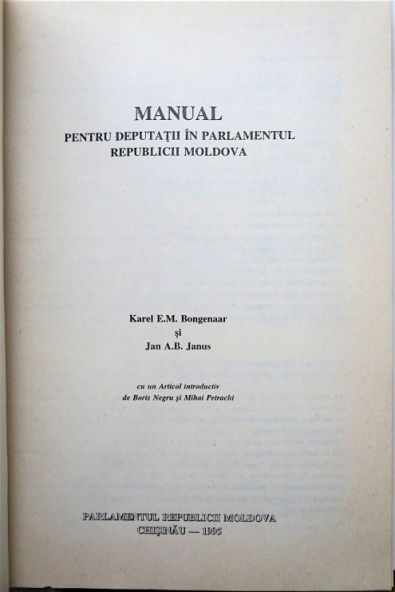
Front page, Manual for the Members of Parliament of the Republic of Moldova
Finally, Janus and his colleague wrote a 122 pages long manual for the MPs. Janus: “It was simply a ‘how to do it’.” He adds: “At our final discussion, our parliamentary counterpart told us: “Yes, you’ve done a wonderful job, very well done. But… our MPs now think they are the best in the world. We’d like some critical feedback as well.” We replied that a critical analysis does not belong in a manual of ‘how to do it’. But they insisted.” So they wrote a second part with critical analyses on various issues, among others about the electoral system, the position of the judiciary and the Prosecutor-General.
Déjà vu
In 2006, Janus travelled again to Moldova, this time to contribute to a project proposal dealing with the compatibility with European Union regulations in diverse areas. Janus: “At some point I got the strange sensation that I was writing a project proposal for the project I believed I had already implemented successfully 12 years ago. After our departure from Moldova, the Communists had ruled for eight years and had obviously done their utmost to restore the practices of the past, before the independence of Moldova.” Janus and his CILC colleague, Eric Vincken, conducted numerous interviews, mostly with MPs of the different parties and representatives from some NGOs. The interviews dealt with how the legislative process functioned in parliament. Janus: “We heard and noticed that with the return of the Communists to power, the country both democratically and with regard to the rule of law had deteriorated and plummeted.” The opposition parties lamented that the Communists were using all their old tricks. Nevertheless, Janus could see clearly that a select group of the population had prospered in the meanwhile.
During a visit to the Parliament, he noticed that the hard cover manual they had written for the MPs back in 1994 was still neatly stored in the Parliament library.
Curiosity as driver
Janus, having retired in 2007 from his work as a legislative lawyer for the Dutch Ministry of Justice, says he has since participated in international projects to satisfy his curiosity. “I want to find things out. Obviously, this derives from my previous experience.” In 1975, Janus became one of the fifteen lawyers engaged in writing the draft laws for the general revision of the Dutch Constitution at the Dutch Ministry of the Interior. Janus: “I was tasked with the topics Royalty and government and, later on, parliament, legislation and the structure of our Kingdom. From then on, I became curious about how other countries arrange their state and why. Pure curiosity. I would like to know how they want to arrange it, why they want to arrange it like that, how they do it in practice and why. And if it constitutes a problem, than you solve it. After all, that’s what legislation is for: to solve problems, societal problems.”
Janus notices that over time, in international policy debates, the focus has changed from ‘governance and democracy’ towards ‘judiciary’. Janus: “This shift is important, but an independent judiciary is not the only aspect. The way in which executive powers relate to legislation and feel subjected to the law is similarly important. This is of course how a ‘rule of law’ starts: with decent legislation. Legislation that is generally considered as just and fair. The judiciary only comes at the very end of the cycle. It’s an important component, but it’s at the end of the process.”
After Moldova, various other international projects followed. Amongst others, Janus went to Ethiopia in 2004, where he participated in a three weeks long CILC baseline study. Together with a Swedish colleague he tried to find out how the Ethiopians would like the process of legislation to be shaped. “It was very intense. The country is beautiful, but I found Addis Ababa quite depressing. There was a lot of poverty. One could notice very well that the country had gone through horrible wars in the past. There were so many victims, without arms or legs, or both.”
Rowing with oars that are way too short
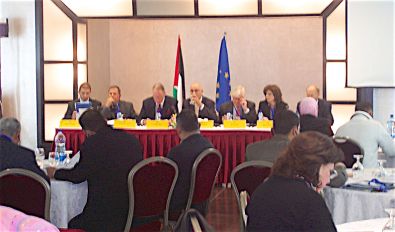
Ramallah 2008 Closing seminar with the Palestinian Minister of Justice, the Project Leader and the members of the working group
Janus also participated in a CILC project in Palestine, Ramallah, funded by the EU. Its aim was to write an administrative procedural law in 30 days. It hasn’t had any follow up yet. He enjoyed doing the project but thinks that it was too early, since the country was not ready for it. “During those 30 days, they should have compiled an memorandum with terms of reference. Consisting of how an administrative procedural law should or could be done. With questions and decision points. They shouldn’t have aimed at ending up with an actual draft law with more or less completed law texts. They should have started at the very beginning. This was rowing with oars that are way too short.” Janus recalls: “I remember one line from one of the advisors of the Palestinian Prime Minister. It concerned the compensation of damage by the government. “Perhaps we should not include this in the law. The government still makes a lot of mistakes and we do not have much money.” “Quite honest.”
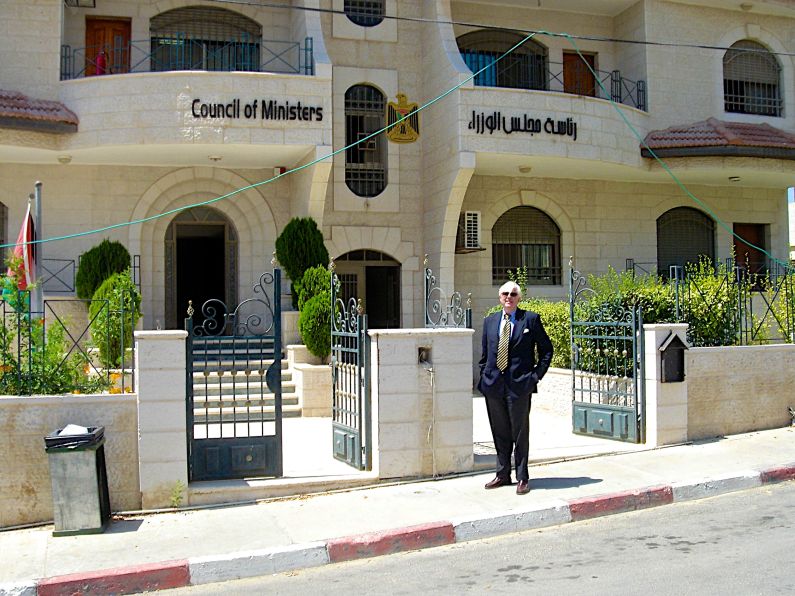
Ramallah, 2008 – Jan Janus in front of the Council of Ministers building
Since 2009, Janus has been participating in legislative training sessions for Indonesian lawyers.
These were initially done for the Indonesian Ministry of Law and Human Rights (‘Kementerian Hukum dan Hak Asasi Manusia’) and later on also for the Ministry of State (‘Kementerian Sekretariat Negara Republik Indonesia’) – the ministry that is serving the president – and for the Ministry of Finance (‘Kementerian Keuangan Republik Indonesia’).
The training for the ‘Sekretariat Negara’ and the Ministry of Finance took place partly in the Netherlands and partly in Jakarta, Indonesia. “The Indonesians knew exactly what they wanted and shared with us their requisites: 20 participants, first in the Netherlands, with a follow-up in Jakarta. They provided us with a list of topics they wanted to know more about.”
Janus organised the programme, with visits to the Dutch ministries of General Affairs, Security and Justice, the Dutch Parliament (‘Tweede Kamer’), the Senate of the Dutch Parliament (‘Eerste Kamer’), the Dutch Council of State (‘Raad van State’). Further, he arranged a number of experts – law professors and a number of former colleagues – for lectures on those topics he was not an expert in. “It’s important to deliver lectures by experts that face similar problems as the Indonesians or at least someone that can relate to them. What do these people do? Most of the officials of the ‘Sekretariat Negara’ do not produce legislation themselves. In Indonesia, the official legislation is prepared within the ministries and submitted to the President. However, it should be tested first by the Ministry of Justice to make sure it is in harmony with other legislation. On the level of the ‘Sekretariat Negara’ the legislation will be tested on different grounds, such as political and policy goals, whether it is in accordance with the policies of the President, etcetera.” One of the topics of the training course of the officials from the ‘Sekretariat Negara’ was how to assess legislative proposals. Since most of the Ministry of Finance staff, contrary to their colleagues at the ‘Sekretariat Negara’, did prepare ministerial regulations themselves, their training focused in particular on evaluation and assessment of existing regulations.
Janus: “In April 2014, we organised a joint seminar for the training course participants of the ‘Sekretariat Negara’, the Ministry of Finance and some staff of the Ministry of Law and Human Rights – in Jakarta. The topic of this course was: Policy and Legislation – How to examine costs and benefits – effects and side-effects?”
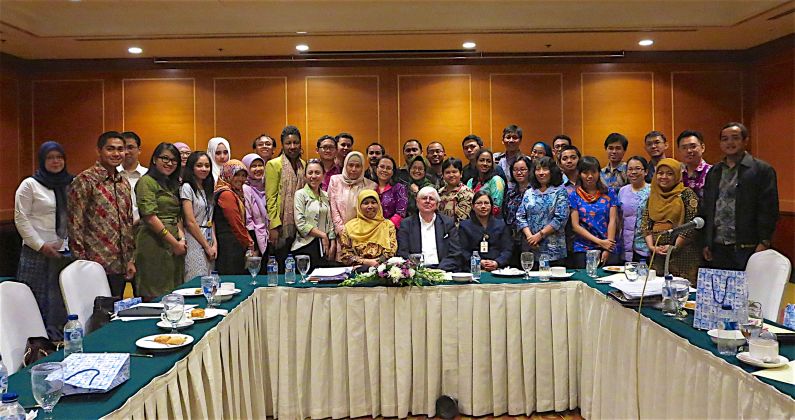
Jakarta, 2014 – The participants of the Joint Seminar
Shared legal history
Janus realised that the Indonesians are “very warm, dedicated professionals” and that the two countries share a common legal history. “We are on the same wavelength.” He considers them to be his junior colleagues. “Just as I have had junior colleagues in the Netherlands, whom I taught in practice how things work, as I have been taught in practice in the past as well. I talk to them and transfer my knowledge and experiences and show them how they can improve what they are working on.”
Since 2011 Janus is also engaged in the Matra South Programme – as course leader, together with his CILC colleague, senior project manager Jalil Taktak. This programme, which includes the countries Egypt, Jordan, Libya, Morocco and Tunisia, was developed by the Dutch Ministry of Foreign Affairs. It intends to support “a sustainable transition to pluralistic and democratic societies governed by the rule of law in the Arabic region and strengthen relations between the Netherlands and recipient countries.” The project also has a focus on legislation. Janus notes that this context is quite different from Indonesia. Janus: “We do not have a common legal history with them. Countries such as Morocco and Tunisia are trained in the French administrative tradition and Tunisia only recently became a democracy. Also, the project period is much shorter: mostly seven days in The Netherlands and a few days there. And Libya obviously has even more of a different history. So there you deliver a different kind of training. This training is much more basic in the sense that the Constitution is being discussed, as well as what constitutes a democratic constitution, human rights, rule of law, etc.”
Janus retired eight years ago. He has been engaged in international projects ever since. Janus: “Sometimes I participate in even more than one at a time. It keeps you sharp. Makes you keep track of your knowledge, update it. It keeps you young.” A week ago, Janus was contacted by his former employer the Ministry of Security and Justice to contribute with his knowledge and skills to the Dutch EU chairmanship. “A wonderful challenge.”
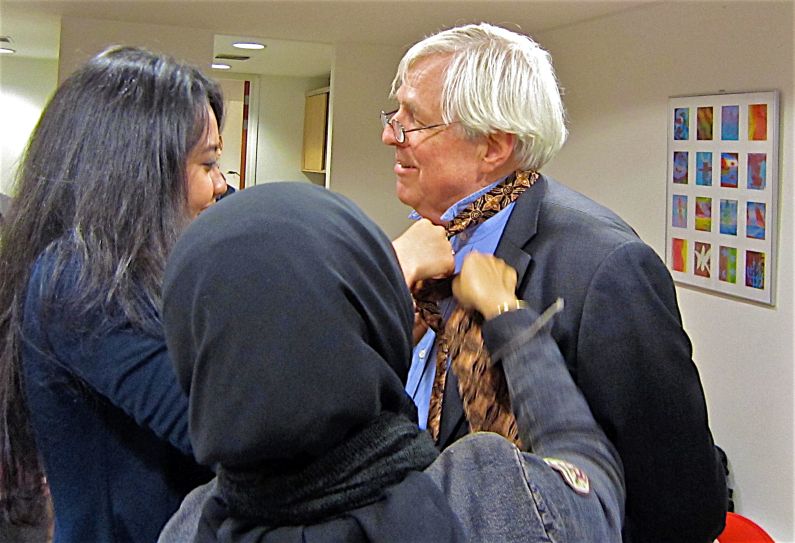
The Hague, 2011 – Two Sekretariat parcipants knotting their gift around Jan Janus’ neck






